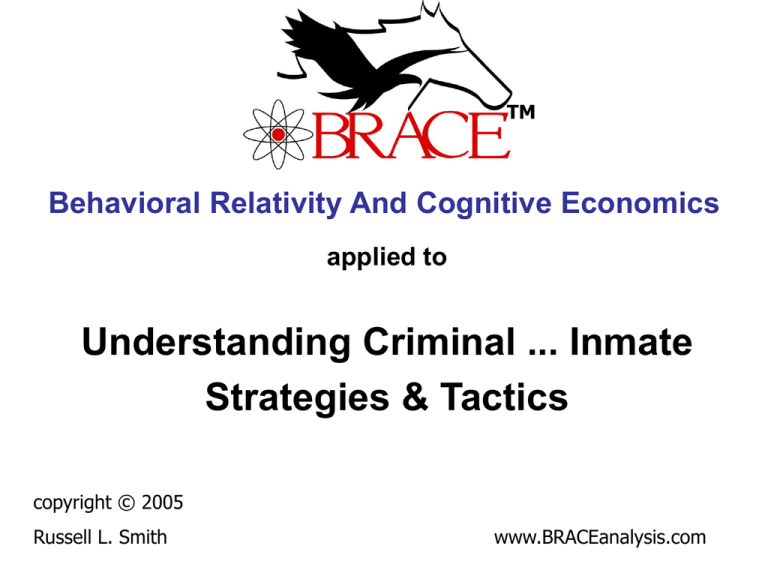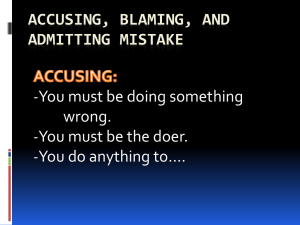
TM
Behavioral Relativity And Cognitive Economics
applied to
Understanding Criminal ... Inmate
Strategies & Tactics
copyright © 2005
Russell L. Smith
www.BRACEanalysis.com
TM
Part I:
Approach Motivated Behavior
Ill, Un-, Mal- & Other Anti- Con Pros
...
(for when you want something too
bad to be honest)
Maladaptive Approach Strategies
1. FLATTERY: Boost the ego & Seduce
for gain.
2. BARTER: Make yourself useful & Start
bending the rules.
3. BRIBE: Exchange payment for values
& Increase the ante.
4. DISOBEY: Be noncompliant & Then
comply for gain.
Maladaptive Approach Strategies
5. DISTRESS: Create distress &
Negotiate relief for gain.
6. OBLIGATE: Create a problem to solve
& Deceive for merit.
7. BLACKMAIL: Show your concealed
hand & Threaten to expose.
8. EXTORTION: Use violence to
persuade & Destruction to force.
Flattery
1. Boost the ego and praise low selfesteem.
2. Study to be sensitive to issues
and sympathetic to pains.
3. Give undivided attention,
unconditional positive regard,
and indiscriminant praise.
Flattery
4. Be quick to support anger and
show no disapproval.
5. Play on dependency and give
liberal approval and support to
the needy.
6. Manipulate guilts and feed fears
to become a source of safety and
security.
Flattery
7. Seduce the naive, exploit the
needy, and make foolish all those
greedy of gain.
Barter
1. Make yourself useful and start
bending the rules.
2. Constantly point out your own
value and pay attention to detail.
3. Identify new ways to provide
“work relief” and become a
consultant or confidant with no
fees up front.
Barter
4. Complement yourself frequently
and say what kind of person you
have always been.
5. Assert your good intentions and
point out all the lessons you have
learned.
6. Selectively provide information
for gain and give advice slanted
for advantage.
Barter
7. Matter-of-factly ask for
increasing favors, always praising
each help received (“Hey, thanks
man! ... I really appreciate that!”)
... and be sure to reinforce the
growing nature of your bond (“I
owe you one!”).
Bribe
1. Every journey starts with a single
step, so look around and see
who’s already going your way
2. Talk about money and talk about
values, see who joins in how, who
barks and who bites.
Bribe
3. Initially conceal the nature of each act
in positive terms ... subtilty building
up a habit of taking compliments and
favors and gifts.
4. Whether for sex, drugs, money, selfesteem, comfort, or deluded love, test
the waters with low risk favors
(omission or commission) ... just
discover the right bait and “work the
relationship” accordingly.
Bribe
5. Learn what to push, when to pull,
where to back off, and how to
keep the common grounds ... just
keep your eye on the prize!
6. Gather evidence as you go and
anticipate the inevitable conflict
and inevitable “parting of the
ways.”
Bribe
7. Reveal your hand only as you
must and always be ready to up
the ante to blackmail.
Disobey
1. Refuse required activities and then
negotiate for gain.
2. Refuse to comply with medical
treatments and elicit supportive
interaction.
3. Refuse to meet routines of daily living
and expect “payment” for personal
care.
Disobey
4. Refuse to get out of bed or go to bed
... refuse to answer or to be silent ...
refuse whatever others want or need
you to do ... then agree to comply for
some gain.
5. Refuse to follow any instruction, even
refuse to respond, unless others grant
you some privilege or promise or
fame.
Disobey
6. Threaten hunger strikes, or other such
lack of self-care, to force others to
meet your childlike demands (But first
make sure there’s someone who does
or must care).
7. “Just say no” to your own
responsibilities and extort some gain
from those charged with your care.
Distress
1. Be increasingly disruptive until your
demands are met.
2. Be increasingly destructive of property
until your demands are met.
3. Be increasingly self-injurious until your
demands are met.
4. Be increasingly violent until your
demands are met.
Distress
5. Create increasing amounts of work for
others until your demands are met.
6. File grievances, threaten lawsuits,
write the governor and the mayor, call
home and tell Ma Ma ... until your
demands are met.
Distress
7. Seek increasingly higher levels of
authority ... until your demands are
met.
Obligate
1. Emphasize any basis for relatedness,
any similarity or common difference,
any grounds for personal identification
or bond (race, gender, religion,
origins, organizations, age, language,
experiences, interests, hobbies, skills
& abilities, any common circumstance
or condition, any value or belief about
life and living ... or death and dying).
Obligate
2. Steal property and arrange for its
return.
3. Plant drugs and “reveal” an elaborate
plot.
4. Buy or make a weapon and turn it in
or arrange for it to be found ... with a
good story to make it well worth
while.
Obligate
5. Play “good inmate-bad inmate” ...
Have a friend (or just pay someone)
to start a confrontation, harassment,
or pressure of any kind --- then you
come to the rescue.
6. Set up or “uncover” a minor breach of
policy/procedure, then you “save the
day” by keeping someone else from
discovering or revealing it ... or using
it for blackmail.
Obligate
7. Create a situation in which others
believe your actions saved life or limb
--- just find a “lifer for hire” or
someone seeking lock-up.
Blackmail
1. Find someone who doesn’t know the
rules well, or perhaps just doesn’t
care, get them to bend one and break
two ... keep the proof till later.
2. Ask for a “small favor” that’s aganinst
the rules, giving compelling reasons
why it would be a good thing to do --hastily!!!
Blackmail
3. Subtilely gather knowledge for a
profile ... dig deepest into the past to
discover weakness, indiscretions,
sufferings, joys, and pains.
4. Offer a little loan just to help out with
debts, (off the record of course) ... or
perhaps that extra soft drink you just
happen to have.
Blackmail
5. Profess love, offer drugs, arrange for
sex ... whatever one’s price, pay it ...
always catering and documenting the
process.
6. Start with small, low risk requests and
favors, to gradually build “risk
tolerance” and increasing compromise
... saving the higher value barriers for
last to break down.
Blackmail
7. Keep up the motivation with bribes to
cultivate “good will” ... resort to fear
tactics only as necessary.
Extortion
1. Use violence as a means of obtaining
reinforcement (commission or
omission) and destruction as a
problem solving device.
2. Shape compliance with a
demonstrated willingness to carry out
all threats.
Extortion
3. Develop power & control through the
systematic use of fear, threatening
harm to whatever is valued (family,
friends, pets, reputation, property,
comfort, control, etc.).
4. Demonstrate utter disregard for
consequences and imply that no one
will help ... make them think and feel
alone.
Extortion
5. Assert that the alternatives make
compliance the only choice available
and that it is something one can live
with.
6. Start small on demands and feed fears
at every opportunity.
Extortion
7. Balance risk & opportunity
management and always up the ante -- parlay extortion into blackmail,
capture the imagination for control,
and use terrorism for power.
TM
Part II:
Avoidance Motivated Behavior
De-, Dis-, & Other Con Cons
...
(for when you get caught and you
know you are at fault)
Maladaptive Avoidance Strategies
1. DENY: Claim ignorance or Simply lie
about it.
2. DISTRACT: Shift the focus or Just
blame someone else.
3. DEFEND: Claim good motives or
Redefine the situation.
4. DISSIMULATE: Act-out of yourself &
Apologize.
Maladaptive Avoidance Strategies
5. DISRUPT: Get on stage & Create
confusion.
6. DISCOMFORT: Create new distress &
Competing concerns.
7. DISRESPECT: Devalue the message &
Disesteem the messenger.
8. DESTROY: Eliminate the evidence or
Exit the situation.
Denial
1. Simply lie about it.
2. Pretend you don’t understand.
3. Don’t tell the whole truth or add just a
bit for the telling.
4. Be evasive and make up excuses as
you go.
Denial
5. Get literal, get technical, and “split
hairs.”
6. Claim you were set-up or were just an
innocent by-stander.
7. Simply refuse to respond or just walk
away.
Distract
1. Simply change the subject or shift the
focus in time --- to yesterday or
tomorrow.
2. Assert equal or better opportunity by
others (“I wasn’t the only person in
the room.”)
3. Ask questions (“Why would I want to
do that?”) and suggest motives by
others.
Distract
4. Don’t answer the question asked or
answer with questions of your own
(“Who said I did it? ... How do you
know it wasn’t someone else?”) and
try to plant any “reasonable doubt” ...
Just be your own lawyer!
5. Point out the faults of others and
bring out other problems that should
be solved.
Distract
6. Assert your recent religious
conversion, or some other profound
change of heart, and claim your new
found “right not to be judged by
others,” insisting it improper to discuss
such, much less to be punished.
Distract
7. Play to empathy or guilt ... say “I
guess that means all of my being good
was for nothing ... all of my hard work
is just down the drain."
Defend
1. Blame someone else for your
emotions or claim “poor impulse
control” (“I was upset ... I just
blanked ... I lost my temper ... He
made me mad ... They should have
taken control ... I just got very bad
news from home.”)
Defend
2. Blame your peers or society and claim
your “right to be bad too,”
(“Everybody else does worse or the
same ... It’s all just a game.”).
3. Become a “victim of choices” --- just
claim to have none of your own (“I did
what I had to do.”)
Defend
4. Blame your traumas or flashbacks or
just blame your sleep or your dreams.
(“I’ve been abused ... had accidents ...
suffered violence ... had no sleep ...
have shattered dreams ... have bad
dreams) ... NOW, I’m sure you
understand!!!
Defend
5. Be a “victim of low self-esteem” --Blame your parents and your life (DO
NOT mention self-respect, selfrestraint, self-discipline, self-control, or
self-sacrifice).
6. Blame any greater need or power
easily at hand (“I’m an addict ... The
Devil made me do it.).
Defend
7. “Redefine the situation” & claim very
good motives (“I did it for you ... for
honor ... to save life or limb.”).
Dissimulate
1. Agree and apologize, straight up and
up front as can be (“I was wrong ...
You were right ... I made a mistake ...
It won’t happen again.”).
2. Act surprised and exclaim, “What!?”
and express utter disbelief.
3. Act hurt and disappointed that anyone
would even think such a thing might
be true.
Dissimulate
4. Act confused or perplexed and plead
ignorance or that you were “out-ofsorts” ... (“I don’t remember ... I don’t
know what got into me ... That’s not
like me at all!”).
5. Act indignant and assert that you were
surely well-framed ... wonder out loud
who it might really be.
Dissimulate
6. Cry and whine and promise profusely
never-ever to do it again.
7. Act respectfully repentant and plead,
plead, plead: for “a little help” to get
on the right track ... “just one more
chance” to do the right thing ... just a
little “forgiveness” so you can cover
your great shame ... just a little more
time to “prove yourself.”
Disrupt
1. Get loud and talk violence.
2. Stand quickly and pace, act explosive
as you storm all about.
3. Scream and shout and curse for
emphasis and to attract attention ...
then play to the audience for support
and sympathy.
Disrupt
4. Talk fast and loud, demand answers,
interrupt and jump to conclusions, go
to extremes, accuse others of deviant
motives and put words in their
mouths (“Oh, so you’re saying ____”).
5. Display displaced aggression: slam
doors, tear paper, throw, hit or kick
objects.
Disrupt
6. Delay compliance as long as possible
and imply you will actively resist any
further control (“You better not touch
me, man”).
7. Disrupt the environment and disrupt
the peace, all for maximum effect.
Discomfort
1. Create other concerns by making
vague threats (“You’ll see ... This isn’t
over ... You don’t want to do this ...
This will be on your hands ...”).
2. Imply or threaten you will harm
yourself.
3. Imply or threaten you will harm
someone else.
Discomfort
4. Imply or threaten your will make
much noise, destroy property or
otherwise disturb the peace (“Nobody
sleeps tonight!”).
5. Imply or threaten you will be
noncompliant with any required
activities or requests.
6. Assert that you know your rights and
threaten to sue.
Discomfort
7. Take control ... demand a grievance
form and order a call for higher
authority (“Get the Sergeant! ...
Lieutenant!! ... Captain!!! ...
Superintendent!!!!”)
Disrespect
YOU!
1. Claim illegal, unethical, or
unprofessional conduct and accuse
those accusing you!
2. Claim discrimination (gender or racial
or religious will do just fine).
3. Claim conflict of interest or ulterior
motives.
Disrespect
YOU!
4. Claim harassment, retaliation or
persecution, directly or on someone
else’s behalf.
5. Claim abuse, neglect, or rights
violations.
6. Claim you were “trapped off” by lies
and planted evidence.
Disrespect
YOU!
7. Claim you are being “disrespected”
and make up any how that you
please.
Destroy
1. Force a transfer: If you are out of jail,
go to jail. If you are in jail, go to
prison. If you are in prison, go to lockup. If you are in lock-up, go to mental
health. If you are in mental health,
request a discharge.
2. Commit rule violations until you are
safely locked-up or transferred.
Destroy
3. Threaten or assault a witness or a
more helpless peer to force your own
demotion in custody and transfer.
4. Threaten or assault staff to force a
demotion or transfer.
5. Commit self-injury (SIB) serious
enough to force a medical or mental
health transfer.
Destroy
6. Create a medical condition serious
enough to warrant a medical transfer.
7. “Check-off” (ask for protective custody
status) ... check-out (threaten or
commit suicide) ... eliminate those you
currently blame for your problems
(threaten or commit murder) ... or
force others to assault/kill you.
TM








